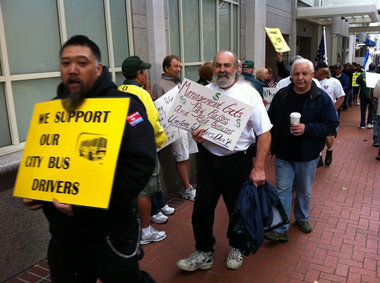Rail~volution's participants were treated to a whole series of workshops titled "Portland: How Did We Do It?" on the last day of the four-day conference. The sessions touted Portland's excellence on everything from regional partnerships to bike innovations to Metro. But outside the conference, just as TriMet's General Manager took the stage, dozens of picketing transit union members reminded us that all is not rosy in Portland transit-land.

Contract negotiations between TriMet and the union are stalled, nearly a year after the previous contract expired. President Jonathan Hunt said that binding arbitration with TriMet has yielded nothing but impasses and retaliation. The union filed an unfair labor practice complaint last month with the state Employment Relations Board, charging that TriMet was bargaining in bad faith.
Now that TriMet is telling workers and retirees they'll have to pay their own health insurance, Hunt wants to take action. He said his members have already made big sacrifices to keep the health care and it shouldn't be taken away. "We took wage freezes; we took rollbacks," he said.
But the union won’t go on strike, Hunt said, because the consequences for riders would be too severe. “When we walk, everybody walks.” (In any case, it's against Oregon law for them to strike.)
This was new to me: Hunt said the transit sector faces higher rates of disability than any other industry. "People don't recognize," he said, "that a transit operator in their normal daily operation is equivalent to a firefighter or a police officer in their 911 mode. There's a lot of stress."
All the more reason, he added, for TriMet to negotiate in good faith. "[The workers] lived up to their agreement," he said. "Now TriMet needs to do the same."





